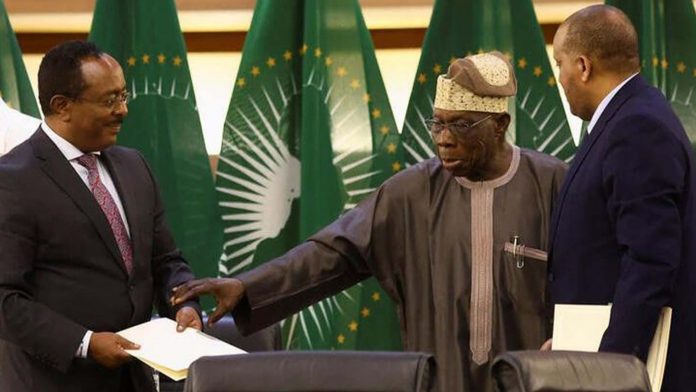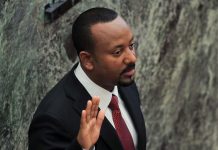
The Ethiopian government and Tigrayan forces have established a telephone hotline to help maintain a ceasefire struck last week, and both sides met in Kenya on Monday for a new round of talks on implementing the truce.
Ethiopia’s government and regional forces from Tigray agreed last Wednesday to cease hostilities after talks mediated by the African Union (AU), a diplomatic breakthrough two years into a war that has killed thousands and displaced millions.
The truce has raised hopes humanitarian aid can start moving back into a region where hundreds of thousands face famine.
“The first sign for me of the progress after the signing of the agreement is the fact that between them they have exchanged a hotline,” AU chief mediator Olusegun Obasanjo told a news conference in Nairobi.
According to an official familiar with the talks, the hotline will address any flare-up in fighting and coordinate disengagements, with both sides recognising “the challenge of fully communicating with all their units to stop fighting”.
Ethiopian Prime Minister Abiy Ahmed’s national security adviser and lead negotiator, Redwan Hussien, said on Twitter that the Nairobi meetings would ensure “safety & expedites humanitarian flow to areas hitherto inaccessible”.
Getachew Reda, spokesman for the Tigray authorities, said earlier on Monday that they would honour their commitments.
He said later on Twitter: “Peace is what our people need more than anything. Whether we will deliver on our promise in a manner that satisfies our people, time will tell.
“We are fighting not because we are a trigger-happy nation but because our survival as a people is at stake. If a peace agreement can ensure our survival, why not give it a try?!”
30-DAY DISARMAMENT
Making the ceasefire stick may be challenging given concerns about some skirmishes on the ground since the truce, unsettled political and territorial disputes and an ambitious disarmament timeline.
The Tigray People’s Liberation Front (TPLF), the party that dominates the region, pledged to disarm its fighters fully within 30 days under the agreement.
In a statement, the AU said that expected outcomes of the talks included “modalities for silencing the guns, humanitarian access and the restoration of services in the Tigray region”.
Officials this week also want to agree membership of an African Union-led panel of experts for monitoring, verification and compliance of the ceasefire, the source familiar with the talks said.
Former Kenyan president Uhuru Kenyatta, co-mediator at the talks, said he hoped the parties would work together to create a permanent resolution of the conflict.
“We started in Pretoria, we are inching our way closer. We are now in Nairobi, we are very hopeful next time we will be in Mekelle for our (next) meeting and ultimately celebrate together in Addis Ababa,” Kenyatta said, referring to the capitals of South Africa, the Tigray region and Ethiopia respectively.
The role of Eritrea, which has not participated in the talks, remains concerning, analysts say. Its troops have fought in the conflict on the side of the Ethiopian army.
The ceasefire agreement says Ethiopia’s army will safeguard the country against “foreign incursion” but analysts are worried about whether Eritrea – the TPLF’s sworn enemy – will listen.
Eritrean Foreign Minister Osman Saleh declined to comment on the agreement. Eritrean Information Minister Yemane Gebremeskel could not be reached for comment.
Reporting by Hereward Holland and Tommy Reggiori Wilkes Additional reporting by George Obulutsa and Ayenat Mersie Editing by James Macharia Chege, Angus MacSwan and Mark Heinrich












